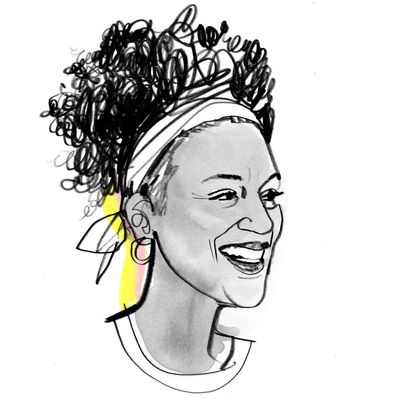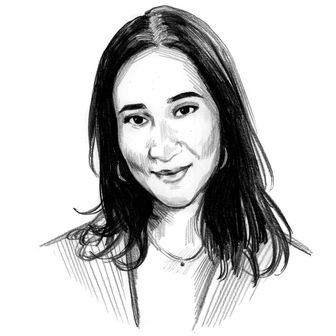
Rebecca Carroll is a cultural critic at WNYC. She’s also the host of the podcast Come Through, a series of conversations about race in America in 2020, which launched this spring and has featured wide-ranging, thoughtful, and prescient conversations with guests like Issa Rae, Ava DuVernay, and Julián Castro. Previously, she was a critic-at-large for the LA Times, and her essays and criticism have appeared in the Atlantic, the New York Times, and more. She’s the author of several books about race in America, including her forthcoming memoir, Surviving the White Gaze, about her experience being raised by a white family in a nearly all-white town, which will be published in February 2021. She lives in Brooklyn with her husband and teenage son. Here’s how she gets it done.
On a typical morning:
I like to sleep! I will not lie to you. I usually get out of bed at about 9 or 9:30 a.m., and start to really focus around 10 a.m. I get up, have coffee, and read, and then I have a meeting with my team for Come Through. After that, we usually have either a tracking session with pick-up for an upcoming episode, or I’ll prep for another interview.
If my son gets up before noon, I’ll cook him something, which is one of the love-hate things about the pandemic. I started out enjoying making meals for him as an act of love, and now he rolls out of bed at about noon or 12:30 p.m. and I’ll make him a very, very good bacon, egg, and cheese. Then I usually go for a run, where I do a lot of thinking and processing, and then it’s the afternoon, when I hunker down to write and piece together in my head how best to introduce the next episode and conversation.
On spending time with her son during lockdown:
Getting more time with my son is the only silver lining of lockdown. And especially now [during the protests in the wake of the police killing of George Floyd], I feel very grateful to have him with me and in my sight. We’ve always been very close. Mostly it’s been a joy. He’s also a teenager, so there have been moments when it’s decidedly not been a joy. But I have really cherished my time with him.
At a time when he’s supposed to be out in the world and figuring out how to socialize and how to be a peer and how to really individuate, he’s really turned to [my husband and I] as resources, and that’s kind of magnificent. We are having more conversations about identity and about what’s happening in the news. What I say to my son, who is a mixed Black child, is that it’s important to embrace your Blackness because the ancestors saw you coming. They have made room for us to be here. We weren’t supposed to be here.
On having difficult conversations:
For years, I’ve been having conversations around issues of systemic racism for my career, and before that. I feel it in my bones on a day to day basis. So I’m glad that people — and by people, I mean especially white people — are turning their focus to conversations about race. But this quote-unquote racial reckoning is not a reckoning if there isn’t a kind of transparency around the evolution of thinking.
We also need to look at where the thinking started, right? I’ll use Gone With the Wind, for example. For me, the issue is not whether or not it should be pulled. It’s much more, what was the thinking when that film went into theaters? It’s not that it wasn’t racist then. It was that people were fine with it being racist. We can talk about destabilizing or dismantling infrastructures and systemic racism, but the main thing that we have to do is dismantle the way people are thinking.
On burnout:
I have pretty good instincts when it comes to not pushing myself too hard. In these past four months, there were only two or three days where I was feeling really physically not well. I’m generally very healthy, but I was just feeling awful. I did a video chat with my doctor, who said to go get a COVID test. And so I did, and I didn’t have COVID.
And what I realized in talking with my people and talking with my squad was that it was the first time that the emotional, intellectual labor of what I’ve been doing sort of physically manifested. I’m not generally one of those people who buys into that. But I believe that was what happened. I was just like, whoa. I had written this piece for the Atlantic where I talked about this anecdote from my childhood where I nearly drowned, that I didn’t even know was a hate crime, until my sister told me three months ago. I was going through final edits on my manuscript, and I called my sister to ask her about another incident where the N-word was used. And she said to me, “I don’t remember that incident, but I definitely remember when so-and-so called you that after she dropped you in the water.” I was definitely trying to metabolize a lot as everything was escalating in the world.
On being a Black woman in media:
As a young Black woman coming into journalism, I felt like I could bring something to the table. But there was this sense of being devalued. It wasn’t like the kind of racism I experienced growing up in an all-white town, in an all-white family. I could identify that. This felt like being a professional somehow required learning how to absorb racism. And so it’s like a war of attrition. You start to feel like, I’m probably not as good.
It’s a crazy-making thing, you know? I return to the Du Boisian effect — the double-consciousness where you feel one way inside, but the world views you differently. And you have to navigate that, negotiate that, make peace with that. Figure out how to continue to grow in a healthy way. And that’s really hard.
That’s one of the things that people, I think, are starting to understand about racism and systemic racism is the toll that it takes psychologically, physically. It’s an ongoing thing where it just chips away at your sanity.
On writing a memoir:
My writing changed markedly in 2014, when Michael Brown was shot in Ferguson and my son, who was 7 or 8 at the time, said, “Are we going to get shot? Are you going to get shot?” There was a kind of urgency and anger that felt absolutely right for the first time in my life, where I just knew who I was and what I wanted to say. I might as well have opened a vein to write this memoir. And I waited a very, very long time, because it is a hell of a story. The most important thing to me is that the writing holds up to the story because anybody can say such and such and such happened. But if it doesn’t really sing, then it’s not worth it.
On winding down:
In the past, I used to just take a nap. Now I tend to either go for a run or cook or call a girlfriend. I’m also a big fan of shopping online for really fancy clothes and just putting them in your cart and not buying them. That somehow gives me a feeling of satisfaction.
I think that learning how to hear your gut is something that comes, frankly, with age. I’ve always been a proponent of instinct, but it takes a while to cultivate how your instincts work and learn to listen to it in myriad ways, in relationships and jobs. So I think mostly it’s been about getting older and just sort of being in conversation with how I feel. It sounds really hippy dippy, more so than I mean it to.


